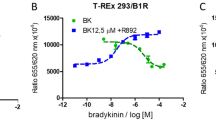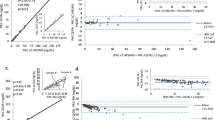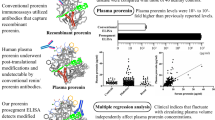Abstract
IN the past few years highly sensitive and specific radioimmunological methods have been developed for the determination of many polypeptide hormones1. Radioimmunoassays are usually based on the competitive reaction of a measured amount of polypeptide hormone labelled with iodine-125 and iodine-131 and varying amounts of unlabelled hormone with hormone antiserum. This report describes a radioimmunoassay technique for bradykinin, a nonapeptide of considerable physiological and pathological importance. Bradykinin differs from other polypeptide hormones, which have been assayed by this method, in its lack of immunogenicity and inaccessibility to iodination. Formation of antibody against this peptide was therefore induced by immunizing goats with a bradykinin–haemocyanin conjugate2. An isotopic label was introduced into the molecule by acetylating its terminal amino-group with 14C-acetic anhydride*. This approach makes it possible to use commercially available bradykinin and renders an isotopic synthesis of the peptide unnecessary. Antibody which binds 14C-acetyl bradykinin was demonstrated in antiserum by a gel nitration procedure which separates antibody-bound from unbound peptide. Partial to complete displacement of the labelled acetyl peptide from its antibody-complex was observed on addition of increasing amounts of unlabelled bradykinin or acetyl bradykinin to the incubation mixture of a fixed amount of 14C-acetyl bradykinin and antiserum. Unlabelled bradykinin was found to be about 10–20 times less effective in this reaction than unlabelled acetyl bradykinin.
This is a preview of subscription content, access via your institution
Access options
Subscribe to this journal
Receive 51 print issues and online access
$199.00 per year
only $3.90 per issue
Buy this article
- Purchase on Springer Link
- Instant access to full article PDF
Prices may be subject to local taxes which are calculated during checkout
Similar content being viewed by others

References
Greenwood, F. C., Proc. Assoc. Clin. Biochem., 3, 209 (1965).
Goodfriend, T. L., Levine, L., and Fasman, G. D., Science, 144, 1344 (1964).
Haber, E., Page, L. B., and Jacoby, G. A., Biochemistry, 4, 693 (1965).
Collip, P. J., Kaplan, S. A., Boyle, D. C., Shimizu, C. S. N., and Ling, S. M., Nature, 207, 876 (1965).
Guttman, St., Pless, J., and Boissonnas, R. A., Helv. Chim. Acta, 45, 170 (1962).
Stewart, J. M., and Wooley, D. W., Nature, 207, 1160 (1965).
Erdös, E. G., Renfrew, A. G., Sloane, E. M., and Wohler, J. R., Ann. N.Y. Acad. Sci., 104, 222 (1963).
Hall, T. C., and Cocking, E. C., Biochem. J., 96, 626 (1965).
Oates, J. A., Pettinger, W. A., and Doctor, R. B., J. Clin. Invest., 45, 173 (1966).
Spragg, J., Austen, K. F., and Haber, E., J. Immunol., 96, 865 (1966).
Author information
Authors and Affiliations
Rights and permissions
About this article
Cite this article
RINDERKNECHT, H., HAVERBACK, B. & ALADJEM, F. Radioimmunoassay of Bradykinin. Nature 213, 1130–1131 (1967). https://doi.org/10.1038/2131130a0
Published:
Issue Date:
DOI: https://doi.org/10.1038/2131130a0
This article is cited by
-
Production of antibodies against bradykinin
Experientia (1979)
-
Application of bradykinin radioimmunoassay for the measurement of urinary kallikrein activity in rats
Klinische Wochenschrift (1978)
Comments
By submitting a comment you agree to abide by our Terms and Community Guidelines. If you find something abusive or that does not comply with our terms or guidelines please flag it as inappropriate.


